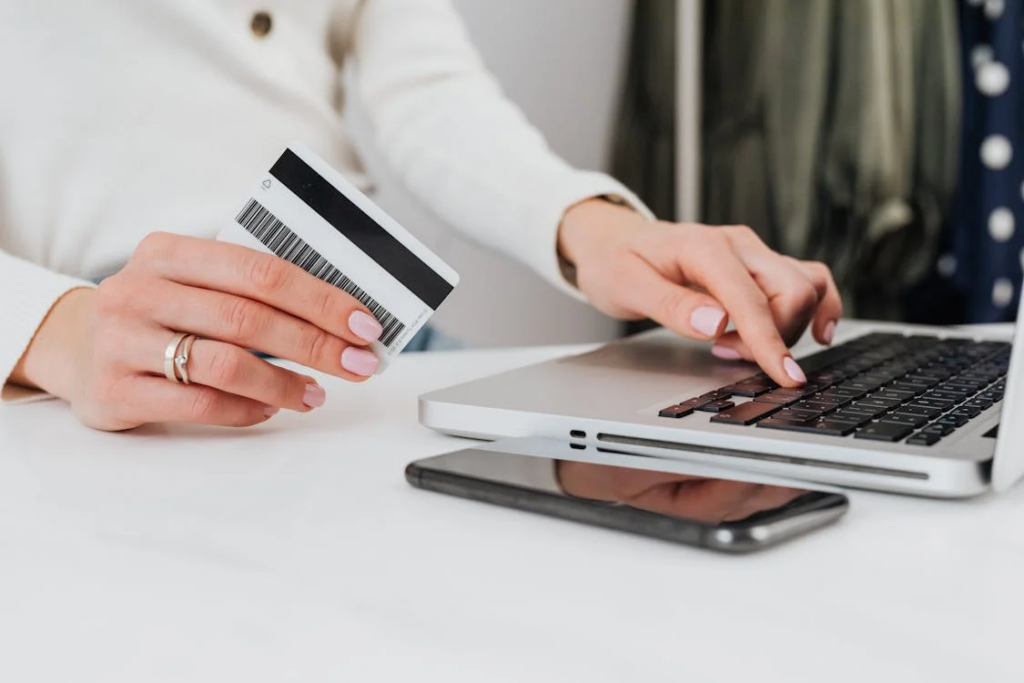Does Paying Off a Credit Card Increase Credit Score and By How Much?

Build strong credit
while you save
Making payments to offset your credit card balance will generally have a significant impact on your credit score. Whether you pay it off in full or nip at it a little at a time every month, your score will likely go up.
But does paying off a credit card actually increase your credit score? While the answer is yes, there are other factors to consider. If you’re focused on growing your credit responsibly or rebuilding from past damage, it’s important to pay attention to your credit activity.
In this article, we explore whether paying off credit cards raises credit score and present techniques you can try to pay off your balance when you’re ready.
Will Paying Off Your Credit Card Improve Your Credit Score?
Paying off your credit card often leads to an increase in your credit score because your credit utilization reduces. The percentage of your available credit in use, also known as your credit utilization ratio, accounts for 30% of your FICO® score, making it one of the biggest factors influencing your score. The general rule is to keep your credit utilization low—ideally below 30%—if you wish to improve your score significantly.
But first, what does credit utilization mean, and how does it impact your credit score?
The credit utilization rate, which is expressed as a percentage, shows how much debt you owe compared to the available credit. Your credit card is a revolving credit line, and the credit utilization rate refers to the amount of credit you use divided by your credit limit.
Keeping your credit utilization below 30% signifies you’re a responsible debt holder. A higher utilization demonstrates to clients that you’re an investment risk, which causes your score to dip.
Your credit score can also drop if you close the credit card account after paying it off. The negative impact may be significant if the card was one of your older accounts or if the closed account reduces your overall available credit. This effect is often minor and temporary, and you should recover fast. Credit score changes typically take about a month to kick in.
How Much Does Paying Off a Credit Card Raise the Score?

There’s no guaranteed number of points increase. The extent to which your score goes up depends on many factors. These include:
- The level of your credit utilization rate before—If your credit card balance was high (over 30% of your limit), paying it off will boost your credit score more than if your balance was already low (under 30%)
- The status of your credit report—Your credit score comprises many components, such as your payment history, length of credit history, credit mix, etc. Settling your card debt is just one of the factors that determine what your score will be
- The speed at which your credit company reports the payment—It takes 30 to 45 days for creditors to send account updates to the credit bureau, so don’t expect to see an instant increase after settling the debt
How you pay off your credit also influences the difference you see in your score. The table below summarizes the increase based on your payment method:
| Payment Style | Score Impact | Reason |
| Paying in full | Noticeable increase | Your credit utilization drops significantly when you clear out the debt, yielding a concentrated boost |
| Paying it off over time | Steady increase over time | Your credit score reflects your progress incrementally as you make each payment |
| Paying off one card out of many | Depends on the card’s impact on your overall credit | Overall utilization across all cards, not one, is what impacts your score |
Summarily, don’t expect a specific point boost when you pay off your credit card balance.
Should You Pay Off Your Credit Card in Full?
You should consider paying off your credit card in full whenever you can. This will help you save money and maintain a healthy credit score. It will also prevent you from accruing more interest charges on your balance and lower your credit utilization, which is ideal for your score.
Refer to your credit card statement to ensure you’re paying off the right amount on your balance. There are two relevant types of balances here—statement balance and current balance. They are similar but different.
Your statement balance is the amount you owe at the end of your last billing cycle and the minimum amount you need to pay to avoid being charged any interest. Your current balance is the most up-to-date amount you owe since your last statement. Paying off this current balance will put your balance at $0 and improve your score.
If you’re already paying off your account statement in full each month, your credit score may not receive any significant boost. If you’re not sure how much you should pay on your credit card balance, always contact your creditor.
The Risks of Relying on Minimum Payments

It may not always be feasible for you to pay off your credit card debt every month. If you’re dealing with financial downtime and can’t afford to pay your credit card balance in full, focus on paying as much as possible. This will help reduce the compounded interest you’ll pay in total.
Still, it’s essential to note that making only minimum payments on your credit card has its downsides. Every card balance you carry to the next month comes with an interest. If you only pay the minimum balance every month, your interest charges accumulate fast.
This means that even if you no longer make purchases with your card but carry balances over to the next month, your credit balance will continue to rise.
For instance, if you owe $5,000 on a credit card with a 20% Annual Percentage Rate (APR) and make a minimum payment of 2% monthly ($100), it’ll take you over nine years (109 months) to pay off the card debt. You’ll also pay an additional $5,840 in interest. But if you raise your monthly minimum payments to $250, you could cut your repayments to about 25 months and pay an interest of about $1,133.
When To Pay Off Your Credit To Boost Score
Now that you understand how paying off a credit card affects your score, you should consider paying it off. When you pay off your credit card is just as important as how you pay it. The ideal time of the month to pay your card balance is unique to your specific financial circumstances. These tips can give you a general guideline to follow:
- Pay ahead—Paying your balance before it’s reported to the credit bureaus can help you keep your credit utilization low. For the best results, pay the balance almost immediately or soon after it’s charged so it doesn’t rise above the recommended 30% range. This also helps you evade late payments and additional charges on the balance that would have been carried
- Pay multiple times a month—If you can afford to, make multiple payments toward clearing your balance in a month. It’s a sure way to keep your credit utilization rate low
Timing your payment is a wise decision, but paying what you owe every month before it’s due has an even greater impact.
How To Pay Off Your Credit Card Balance

The following strategies and resources will help you chip at your balance and completely erase it in a short time:
- Use the debt avalanche method
- Try the debt snowball method
- Get a debt consolidation loan
- Use a balance transfer credit card
- Improve your credit score
Use the Debt Avalanche Method
This debt repayment method allows you to save significant money on interest. It prioritizes paying off debts with the highest interest rates first, regardless of the balance. Minimizing the total interest you pay over time helps you save money.
Here’s how it works:
- Begin by listing your debts, including credit cards, personal loans, medical bills, and other outstanding debts
- Arrange the debts from the highest interest rate to the lowest, then make minimum payments on all the debts, excluding the one with the highest interest
- Use all extra money to “attack” the high-interest debt, aggressively paying it off and reducing the accruing interest that comes with it
- Once the high-interest debt is paid off, channel the money you were using to pay it off toward the next high-interest debt and “attack” it until it’s eliminated too
Following this strategy is one of the most efficient ways to pay off debt if you can stick to it.
Try the Debt Snowball Method
This strategy requires spending extra money to pay off the card with the lowest balance while making minimum payments on your other cards. Once you pay off the card, direct the funds to the next balance and repeat the process.
With this method, you will pay more interest but also see quick wins. You settle more debts and see progression in your report, which can be motivating.
Get a Debt Consolidation Loan
A debt consolidation loan is a personal loan used to pay off credit card debts. You take out a new loan to pay off existing credit card debt and make fixed monthly payments on the loan until you pay it off.
It’s beneficial because you don’t have to manage multiple due payments; you’ll only need to pay one monthly charge, and you know exactly when the debt will be paid. These types of loans may also have lower interest rates than average rates on other types of debts.
Use a Balance Transfer Credit Card
On a balance transfer card, transfer the balances you owe from one or more high-interest cards to a new credit card offering a low or 0% introductory APR on balance transfers. The introductory APR period gives you a grace of several months before you’re required to start paying interest on the transfer balance.
Bear in mind that some cards may charge you a fee to transfer your balance, and in some cases, you may need a good credit score to get a favorable balance transfer card.
Improve Your Credit Score
A good credit score is necessary if you want to access many of the debt repayment methods listed above. It makes securing a debt consolidation loan easier, for example. Negotiating lower interest rates with your existing creditor also becomes easy since your score demonstrates healthy borrowing habits.
Working with a credit building solution like CreditStrong puts you on the right path to accessing better financing options and loan terms. With its easy-to-access credit building loans or revolving credit, you can boost your score and increase your chances of qualifying for debt repayment loans and rates.
CreditStrong—Your Pathway to Financial Stability

CreditStrong offers diverse credit building products that enable you to increase your credit score, empowering you to access better financial terms and products that will pay off your loan. There’s no minimum credit score requirement—you can apply for a CreditStrong account even if you’re growing your credit from scratch, or building back up from past damage. Since no hard credit pull is involved in the process, your score will not be affected when you open an account.
This platform, powered by Austin Capital Bank, is an effective way to improve your credit score without a credit card. In addition to building your credit score, CreditStrong allows you to grow your savings simultaneously.
It offers three main types of accounts: Instal CS/MAX, Revolv, and MAGNUM, through which you can build a positive payment history, grow your savings, and boost your score. Here’s how they work:
| Account Type | How It Boosts Your Score |
| Instal/CS Max | Builds a positive payment history, the most important FICO factor, through on-time monthly payments. It adds an installment loan to your credit mix and reports when the loan is paid off |
| Revolv | Helps improve your credit utilization ratio, especially if a high credit card balance is hurting your score. As long as you make on-time payments and keep your card balance low, your utilization improves, and the credit line increases |
| MAGNUM | Includes an installment loan that functions like Instal but with a larger loan amount for long-term impact on your credit |
CreditStrong reports your payments to all three major bureaus, Experian, Equifax, and TransUnion, so you can rest assured that the process is safe and transparent.
Getting Started With CreditStrong
You can open a CreditStrong account with low or no credit. Here’s how:
- Click here to get started
- Choose from the three products as needed:
- MAGNUM—Starting at $30 a month
- Revolv—$99 a year
- Instal—Starting at $28 a month
- Submit an online application for a CreditStrong account
- Track your progress in your dashboard
CreditStrong helps improve your credit and can positively impact the factors that determine 90% of your FICO score.
